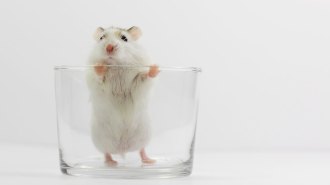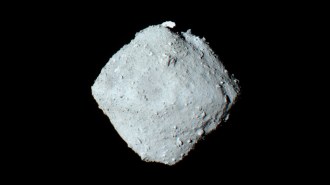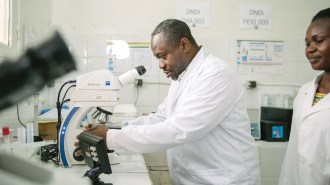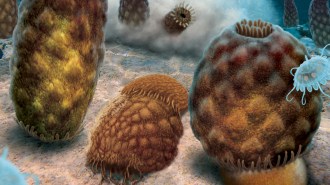Uncategorized
-
 Space
Space‘Off-Earth’ asks how to build a better future in space
As humans prepare to live in space someday, ethics should be as much of guide as science and technology, an astrophysicist argues in a new book.
-
 Health & Medicine
Health & MedicineA hormone shot helped drunk mice sober up quickly
Drunk mice injected with the hormone FGF21 woke up and regained their balance faster than inebriated mice that did not receive the shot.
By Freda Kreier -
 Space
SpaceA crucial building block of life exists on the asteroid Ryugu
A sample from Ryugu collected by Japan’s Hayabusa2 spacecraft contains uracil, a component of RNA, which is found in all living cells.
-
 Health & Medicine
Health & MedicineSleeping sickness is nearing elimination. An experimental drug could help
Clinical trials of acoziborole are under way in sub-Saharan Africa, where sleeping sickness is endemic.
By Meghan Rosen -
 Health & Medicine
Health & MedicineU.S. cases of a deadly fungus nearly doubled in recent years
Though numbers are still small, clinical cases of Candida auris in the jumped 95 percent from 2020 to 2021, a CDC survey finds.
-
 Astronomy
AstronomyThe mystery of Christiaan Huygens’ flawed telescopes may have been solved
The discovery of Saturn’s largest moon, Titan, may have come despite its discoverer, Christiaan Huygens, needing eyeglasses.
-

-
 Paleontology
Paleontology310-million-year-old fossil blobs might not be jellyfish after all
An ancient animal called Essexella may have been a type of burrowing sea anemone, a new study proposes.
By Meghan Rosen -

Where does plastic go when we’re done with it?
Editor in chief Nancy Shute discusses the ubiquity of microplastics in food, water, air and the body.
By Nancy Shute -
 Climate
ClimateBy flying over atmospheric rivers, scientists aim to improve forecasts
Drenching atmospheric rivers are slamming the U.S. West Coast, bringing needed water but dangerous flooding. Here’s how scientists study these storms.
-
 Agriculture
AgricultureMartian soil may have all the nutrients rice needs
Experiments hint that in the future, we might be able to grow the staple food in the soils of the Red Planet.
By Nikk Ogasa -
 Oceans
Oceans50 years ago, researchers discovered a leak in Earth’s oceans
An analysis of oceanic rocks hinted that ocean water drains into Earth’s mantle. How much makes it back into the ocean remains unclear.